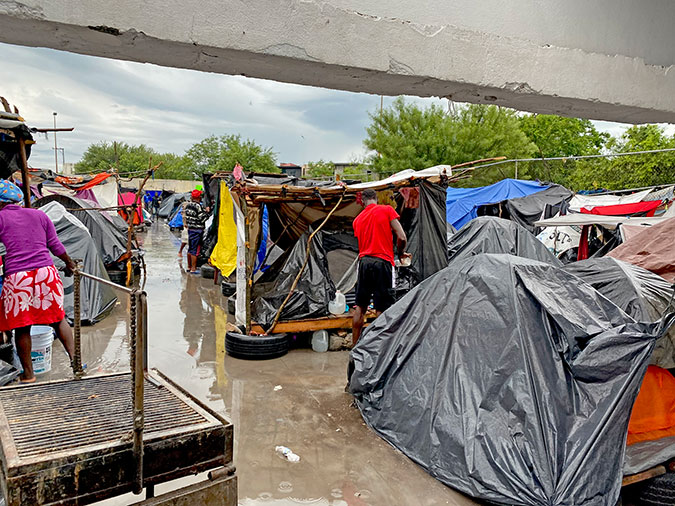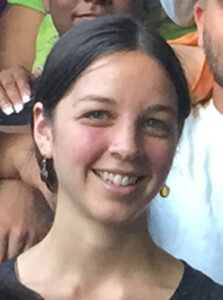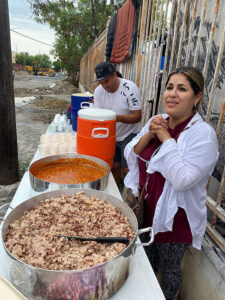
Emily Sinnwell of Iowa Catholic Worker in Iowa City witnessed the dire situation at the U.S.-Mexico border during a recent trip there.
By Barb Arland-Fye
The Catholic Messenger
IOWA CITY — Emily Sinnwell, a family and psychiatric nurse practitioner and advocate for immigrants, wanted a firsthand view of what immigrants experience at the border and to get a better understanding of the current situation. When she learned that a COVID-19 pandemic-era health policy called Title 42 would expire May 11, she headed for the U.S. border in McAllen, Texas, just across the Rio Grande River from Reynosa, Mexico.
The Iowa City Catholic Worker, which Sinnwell co-founded with David Goodner, has worked closely with a Mexican pastor in Reynosa who serves immigrants in camps and shelters there. “We have been working with Pastora Lily (Carlos Escobedo) since summer of 2021 on Title 42 exemptions,” Sinnwell said. “Many of the immigrants who I work with had stayed with Pastora Lily or came through the Catholic Charities Respite Center (in McAllen). I wanted to see what they experienced and witness what was going on at the border.”
Title 42 “deprived migrants of their right to seek asylum, a right enshrined in U.S. and international law,” the Catholic Legal Immigration Network, Inc. (CLINIC) stated in a May 11 news release. “CLINIC remains concerned that the plans to manage border arrivals post-Title 42 include dangerous restrictions on asylum and other harmful policies.”
While volunteering on both sides of the border, Sinnwell had the opportunity to see Sister Norma Pimentel, a Pacem in Terris Award recipient (2022) and executive director of Catholic Charities of the Rio Grande Valley. Catholic Charities oversees the Humanitarian Respite Center in McAllen, Texas, across the river from Reynosa. Sister Norma regularly travels to Reynosa to be present to the immigrants there.
“Emily was with us the week Title 42 lifted. Her presence on both sides of the border was a gift of kindness and care to the immigrants,” Sister Pimentel said. “Every time I encountered her at the center I always found her with a beautiful smile that radiated kindness. Having her with us both in McAllen at the humanitarian respite center and in Reynosa helping immigrants in Mexico was a great help, especially in the week that Title 42 was lifted. My word of advice to Emily was to continue smiling, it is a beautiful way to bring hope. And to stay safe!”
Reynosa has four shelters and four camps. The Catholic Church operates one shelter, the Evangelical church operates another shelter and two Mexican nonprofits operate two. “There are many more along the border,” Sinnwell said. “The camps are outside, with makeshift shelters made up of tarps. The one shelter I was able to tour was newer, folks had shared rooms, area for school, outside patios, kitchen and office space.” She said there are not enough volunteers. “Many more are needed.”

She spent most of her time accompanying people to the bus station to find prices and times for bus departures to where they need to go. She also assisted with meal preparation. “At the camps, we prepared food for about 250 people. With five servers it took about 40 minutes to serve the food and yes we ran out. There are so many people. One day at the respite center, due to the number of folks, there was one meal where we weren’t able to serve everyone. The respite center has a good process for serving food and they serve a good amount of food to each person.”
Sinnwell also had the opportunity to use her nursing skills daily, “from listening and providing supportive care to taking blood pressure, to giving out OTC medications and education to families and children.” She received a $4,800 grant from the Iowa Nurse Practitioners Society to fund her visit and to purchase supplies for the immigrants at the border. Her budgeting allowed her to maximize the amount she provided in assistance.
In a text message, Pastora Lily described Sinnwell as a great help. “We really appreciate her caring so much for the asylum seekers and also our community and (she) was always willing to learn the way we cook and serve in our community. We serve meals to 300 to 500 migrants when we have resources!!”
What brings Pastora Lily hope in her work with the immigrant community is the God-given opportunity to be in immigrants’ lives at their most vulnerable moment. “They will never forget that

Volunteers get ready to serve a meal along the U.S.-Mexico border last month.
through this sad moment someone was there to make them feel loved, respected and cared (for)!! We absolutely need more volunteers and the resources to continue to spread Jesus’ Love with a hot meal!!!”
Immigrants arrived from as far away as Columbia, Venezuela, China, Africa and Haiti. “It was a difficult journey for all,” Sinnwell said. “One woman from Venezuela described the most dangerous countries to travel through were Nicaragua and Guatemala. At one point in Guatemala the bus she was on was stopped by a group of men. They chose a young woman with a child and took her off the bus to beat and rape her.”
Predictions that a surge of immigrants would arrive at the border when the U.S. government lifted Title 42 did not materialize. “It was calm when I went. There were about 30 people sitting, waiting to cross. I didn’t see any Mexican officers on the Mexico side when I walked back across, but once I crossed to the middle of the bridge, I saw a group of U.S. officers, about four or five. There were three officers/three lines for folks to present and show their passport.”
Returning to Iowa, “It is hard to accept and process the wealth (money, food, housing, etc.) we have here in the United States while seeing the desperation at the border. We are all God’s children but there are so many disparities,” Sinnwell said. “The immigrants at the border are not criminals but human beings, moms, sons, dads, daughters, etc., seeking safety from where they are coming from. The border is dangerous for these folks, where rape, kidnapping, abuse, happen. The trauma of leaving your home and everything behind is unimaginable, but their trip is just the start of the trauma they will face.”











